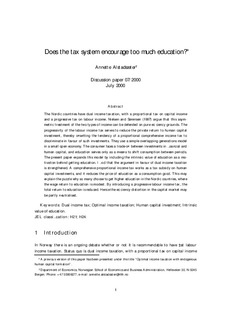| dc.contributor.author | Alstadsæter, Annette | |
| dc.date.accessioned | 2006-08-15T10:59:37Z | |
| dc.date.available | 2006-08-15T10:59:37Z | |
| dc.date.issued | 2000-07 | |
| dc.identifier.issn | 0804-6824 | |
| dc.identifier.uri | http://hdl.handle.net/11250/162988 | |
| dc.description.abstract | The Nordic countries have dual income taxation, with a proportional tax on capital income
and a progressive tax on labour income. Nielsen and Sørensen (1997) argue that this asymmetric
treatment of the two types of income can be defended on pure efficiency grounds. The
progressivity of the labour income tax serves to reduce the private return to human capital
investment, thereby offsetting the tendency of a proportional comprehensive income tax to
discriminate in favour of such investments. They use a simple overlapping generations model
in a small open economy. The consumer faces a trade-off between investments in financial and
human capital, and education serves only as a means to shift consumption between periods.
The present paper expands this model by including the intrinsic value of education as a motivation
behind getting education. I find that the argument in favour of dual income taxation
is strengthened. A comprehensive proportional income tax works as a tax subsidy on human
capital investments, and it reduces the price of education as a consumption good. This may
explain the puzzle why so many choose to get higher education in the Nordic countries, where
the wage return to education is modest. By introducing a progressive labour income tax, the
total return to education is reduced. Hence the efficiency distortion in the capital market may be partly neutralised. | en |
| dc.format.extent | 114835 bytes | |
| dc.format.mimetype | application/pdf | |
| dc.language.iso | eng | en |
| dc.publisher | Norwegian School of Economics and Business Administration. Department of Economics | en |
| dc.relation.ispartofseries | Discussion paper | en |
| dc.relation.ispartofseries | 2000:7 | en |
| dc.subject | dual income tax | en |
| dc.subject | optimal income taxation | en |
| dc.subject | human capital investment | en |
| dc.subject | intrinsic value of eduation | en |
| dc.title | Does the tax system encourage too much education? | en |
| dc.type | Working paper | en |
